Twice a year, Research Co. and Glacier Media review the perceptions of Canadians on foreign countries. The first iterations of this exercise usually saw positive perceptions for most fellow members of the G7 and negative ones for countries with dubious human rights records.
The bottom spots in these rankings usually featured a battle between Saudi Arabia and North Korea. , the Russian Federation became the new cellar dweller, when 12 per cent of Canadians expressed a positive opinion of it.
Little has changed in early 2023, as the invasion of Ukraine continues with no clear end in sight. We found that only 11 per cent of Canadians hold positive views of Russia, down a point since May and significantly lower than the 26 per cent observed on our first survey .
There is a particular group of Canadians that appears to have grown immensely tired of what Russia is all about right now. Only three per cent of those aged 55 and over have a “moderately positive” opinion of the country and not one expresses a “very positive” view. Residents of all provinces are having a hard time finding redeeming qualities in the Russian Federation.
Only three other countries garner positive mentions from fewer than one in five Canadians: China (18 per cent, down two points), Iran (13 per cent, down three points) and North Korea (11 per cent, down two points).
It is clear that, even as time has passed since the height of the diplomatic impasse with China precipitated by the arrest of Huawei Technologies Co. Ltd. chief financial officer Meng Wanzhou in Vancouver, Canadians are not changing their minds about China. Nothing has improved perceptions on Iran and North Korea, even if we are significantly more informed about current events in only one of these nations.
The proportion of positive views about the six non-North American members of the G7 remain high, with the United Kingdom leading the way (74 per cent, up one point), followed by Italy (71 per cent, down two points), Germany (69 per cent, down one point), Japan (70 per cent, up one point) and France (also 70 per cent, also up one point).
It is important to note that the past six months featured plenty of news from the United Kingdom, such as Commonwealth nations considering republicanism, the death of a long-standing monarch and plenty of media stories from the current heir and “spare.” We will look into the way Canadians feel about the monarchy in March. Still, the numbers on the United Kingdom itself are stable and not near the 83 per cent rating observed in 2019.
The needle did not move much for three other nations that we have consistently tested: South Korea (57 per cent, down), Venezuela (30 per cent, down one point) and Saudi Arabia (23 per cent, down one point).
The one surprise in our first survey of 2023 is India, which experienced the best fluctuation on positive opinions, going from 37 per cent in May 2022 to 41 per cent in January 2023. Men (48 per cent), Canadians aged 18 to 34 (46 percent) and British Columbians (45 per cent) are currently more likely to hold favourable views of India.
Our partners in continental free trade post steady numbers. We see 54 per cent of Canadians expressing positive views on the United States, down two points since May. Mexico checks in at 49 per cent, down one point.
There are some issues to watch in each one of these countries. Positive perceptions of the United States have remained firm since it became clear that Joe Biden would replace Donald Trump in the White House. , in the middle of the last American presidential campaign and with Canadians looking down sneeringly at COVID-19 case numbers down south, positive perceptions of the United States stood at a particularly low 32 per cent.
In Mexico, the challenge is different. In spite of lengthy discussions about energy policy and investment, public safety must now be on the minds of Canadians, as cartel violence reaches areas where tourists used to roam relatively carefree. A deteriorating situation, entirely possible under a president who is quick to bemoan and slow to act, could have an impact on the destinations that Canadians choose for leisure, especially among those eager to get away after years of idleness on account of the pandemic.
Mario Canseco is president of Research Co.
Results are based on an online study conducted on January 2 to January 4, 2023, among 1,000 adults in Canada. The data has been statistically weighted according to Canadian census figures for age, gender and region. The margin of error – which measures sample variability – is plus or minus 3.1 percentage points, 19 times out of 20.




